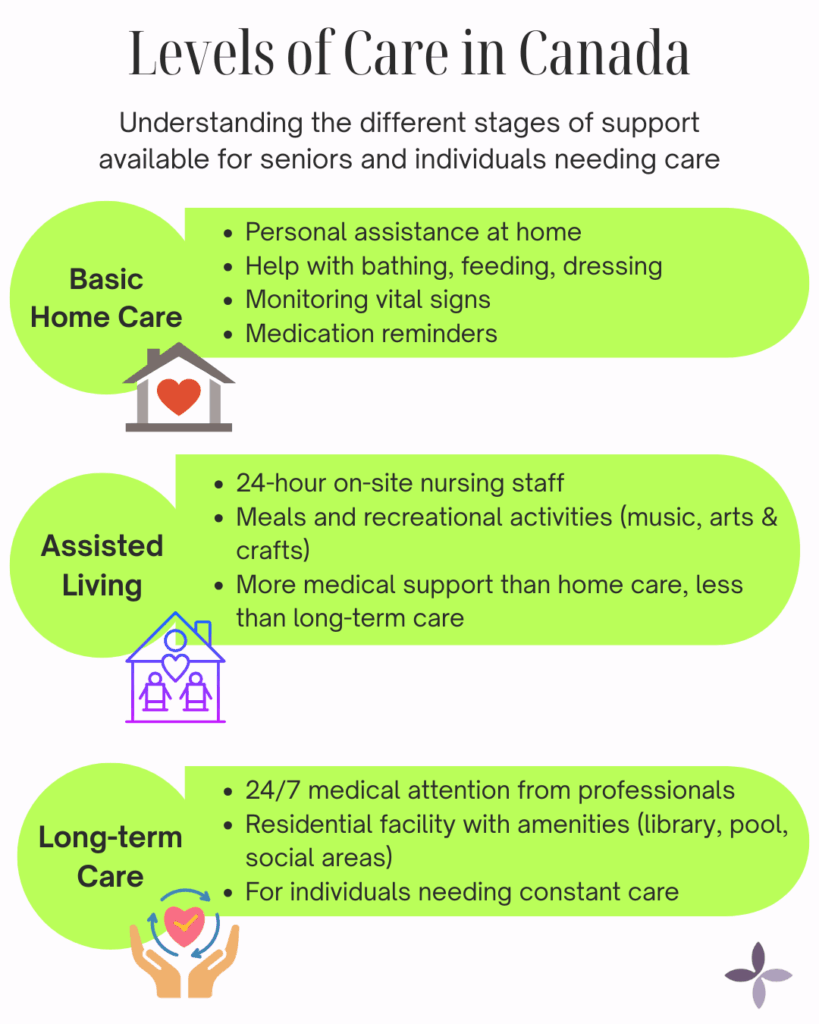What Is Home Care In Canada?
Home care in Canada is a broad term that encompasses a wide range of services and supports for people who need assistance with daily living. The purpose of home care is to help keep people independent and living in their own homes. Home care is available to people with a wide variety of medical conditions and disabilities, including:
- Chronic conditions like heart failure, diabetes, and COPD;
- End-of-life care;
- Post-hospital rehab or recovery after surgery or injury;
- Injury rehabilitation after an accident or fall; and
- Alzheimer’s disease or dementia.
Home care services may include help with daily activities such as eating, bathing, dressing, and grooming. They may also include assistance with transportation to appointments and other errands, assistance with managing medication, and monitoring health issues.
What Are The Levels Of Care In Canada?
Canada’s healthcare system includes four main levels, each offering a different degree of medical support, from basic check-ups to advanced treatments.
- Primary Care
- What it is: Your first stop for general health needs.
- Example: Visiting a family doctor for a check-up or mild illness.
- Secondary Care
- What it is: Specialized care, usually by referral.
- Example: Seeing a cardiologist for a heart issue.
- Tertiary Care
- What it is: Hospital-based care for complex conditions.
- Example: Heart surgery or cancer treatment.
- Quaternary Care
- What it is: The most advanced, specialized level of care.
- Example: Experimental treatments or rare surgeries.
Additionally, Canada’s healthcare system includes specialized senior and continuing care options, such as basic home care, assisted living, and long-term care facilities.

What Are Some Examples Of Home Care Services?
Home care services are designed to meet your loved one’s specific needs. They can include:
- Personal and daily care: This may include bathing, dressing, and grooming services as well as light household duties.
- Medical and health-related services: Home care providers can also help with medications and wound care if your loved one is recovering from surgery or has an illness like diabetes or heart failure. Skilled nursing, physical therapy, occupational therapy, or speech therapy.
- Nutritional Support: If your loved one needs help eating, drinking, or managing his/her diet due to illness or disability, then home health nurses will provide this service as part of their routine visits.
- Socialization Opportunities: Your loved one may not be able to leave your home easily due to illness or disability, but some agencies offer activities such as games, crafts, and outings to senior homes or assisted living facilities where they can enjoy conversation with other residents and visitors from outside their community.
- Household and logistical support: Light housekeeping (cleaning, laundry, tidying), meal planning and preparation, grocery shopping, and other errands.
Where Can I Find Home Care For My Loved One?
If your loved one needs help with daily activities or medical support, Saige Homecare is here to provide reliable, compassionate care.
Our trained home health aides and nurses assist with personal care, medication management, and recovery support; all in the comfort of home.
At Saige Homecare, we focus on safety, dignity, and independence, giving families peace of mind knowing their loved ones are in capable hands.
Get the care your family deserves. Contact Saige Homecare today to speak with one of our care experts.


